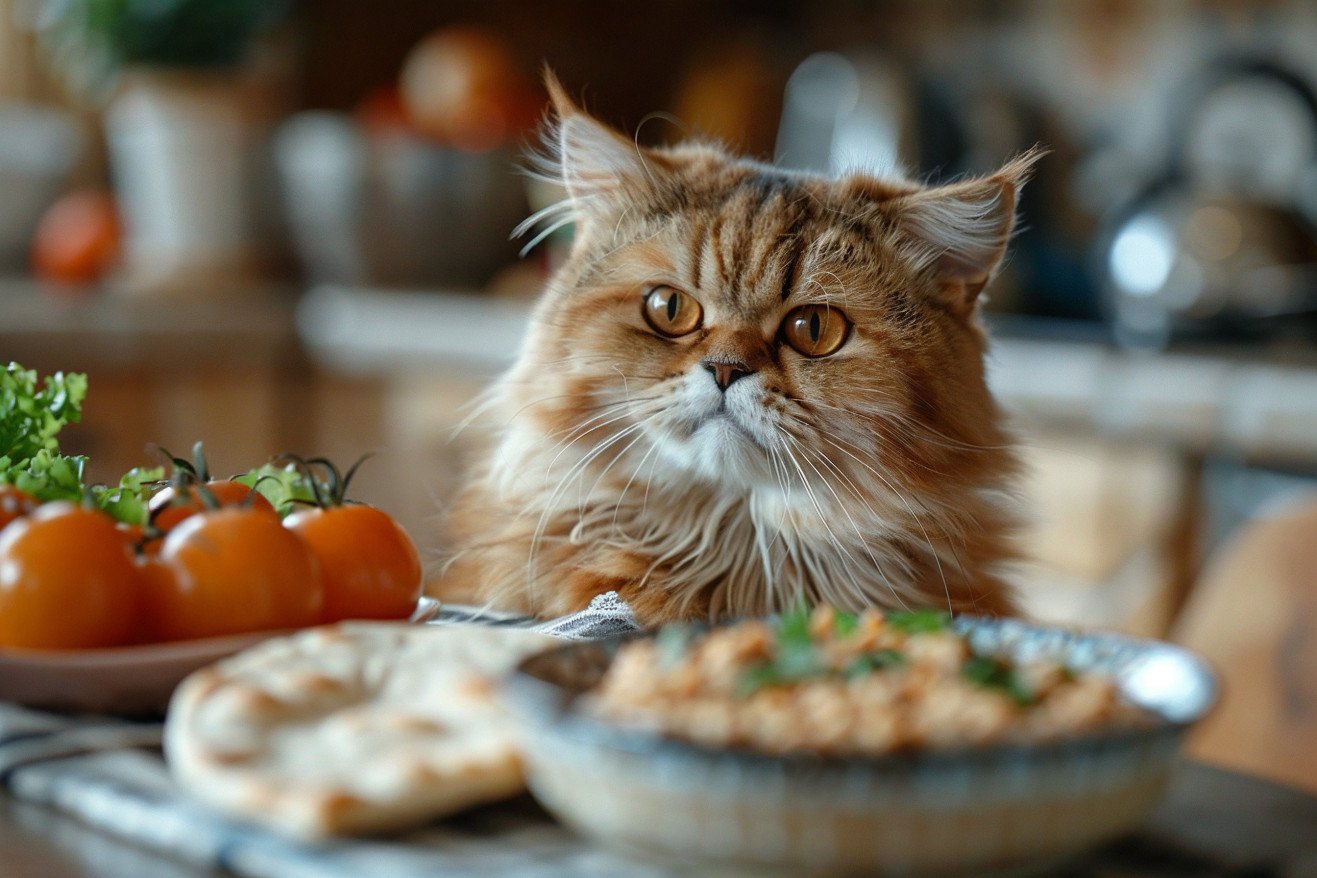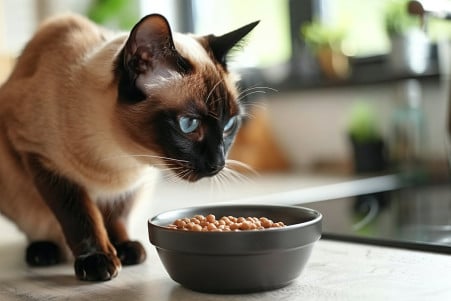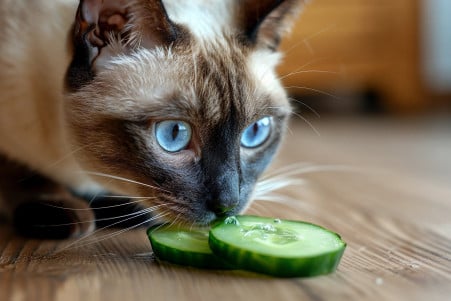Can Cats Have Hummus? What You Need to Know About This Chickpea Dip
20 May 2024 • Updated 20 May 2024

If you’ve ever wondered whether your cat can have a taste of hummus, you’re not alone. While a small amount of hummus probably won’t hurt your cat, you should not feed it to them regularly. This is because the oils, garlic, and other spices in hummus can lead to digestive problems and other health concerns in cats.
In this article, we’ll reference veterinarians and consider what cats need in their diets to find out more about the ingredients in hummus and how they might impact your cat. By the time we’re done, you’ll know what to look for in healthy snacks for your cat and understand why it’s important to make sure your cat’s food is formulated to meet all of their nutritional needs. You’ll also know whether or not it’s okay to give your cat a little hummus every now and then or if you should avoid it altogether.
Can cats eat hummus?
Cats as Obligate Carnivores: What Cats Need in Their Diet
Cats are considered obligate carnivores, which means they need nutrients that are only found in animal products and have a dietary requirement for high levels of animal-based proteins and fats. Cats are natural hunters and have evolved to eat prey that has very low levels of carbohydrates.
In order to stay healthy, cats need certain nutrients that are found mainly in animal products, including taurine, arginine, and essential fatty acids. Taurine is an amino acid that cats can't produce themselves, and it's important for heart and eye health. Arginine helps with the urea cycle, and cats that don't get enough arginine can develop ammonia toxicity.
A diet that's too high in carbohydrates and plant-based products can lead to nutrient deficiencies and other health problems, as the Cornell University's Feline Health Center points out. That's why it's important to make sure that your cat's diet includes complete and balanced commercial cat foods like those from Hill's Pet Nutrition that are designed to meet the specific needs of cats.
It's also important to make sure that any changes to a cat's diet or new foods that are being introduced are approved by a veterinarian so that you can be sure that the cat's nutritional needs are being met. If a cat is transitioned to a new diet too quickly, it can lead to serious health problems.
Breaking Down Hummus: Nutrients and How They Impact Cats
Hummus is a popular dip that is made from a combination of chickpeas, tahini (ground sesame seeds), olive oil, lemon juice, and often garlic. While a small amount of hummus is unlikely to hurt a cat, the ingredients in hummus can have negative impacts on a cat's health if they eat too much of it.
According to Philiperneealexsandro, the main issues with hummus and cats are the garlic and lemon juice. Garlic has organosulfides that can cause oxidative damage to a cat's red blood cells and lead to Heinz body anemia, even in small amounts. Citric acid in lemon juice can also disrupt a cat's digestive system, leading to vomiting.
As Cooper Pet Care points out, the chickpeas in hummus are not poisonous to cats in small amounts, but they can be hard for cats to digest. In addition, the fat and sodium from the olive oil and tahini can cause digestive problems. Cats are obligate carnivores and have very different dietary requirements than humans.
While a small amount of hummus is unlikely to be dangerous, it's best to avoid giving it to cats on a regular basis. As with many things, the key is moderation, and it's important to check with a vet before adding new foods to a cat's diet, especially if they contain potentially harmful ingredients like garlic.
Hummus Toxicity in Cats: Signs, Symptoms, and What to Do
As noted in the Catster article, one of the reasons cats should not eat hummus is because of the toxicity of some of the ingredients. The biggest red flag is the use of garlic, which can cause oxidative damage and Heinz body anemia in cats if they consume it, even in small amounts.
Preventive Vet also points out that the high fat and oil content from ingredients like tahini can cause gastrointestinal upset in cats, and some hummus recipes also include lemon juice or hot sauce, which can make a cat's tummy troubles even worse.
If a cat eats a large amount of hummus, especially if it contains garlic or onions, the cat's owner should call their vet right away. Symptoms of hummus toxicity can include vomiting, diarrhea, lethargy, and anemia, but the exact symptoms will depend on the amount of hummus and the specific ingredients the cat has eaten.
It's important to watch a cat closely after they've eaten hummus and to call a vet at the first sign of trouble. While a small amount of hummus is unlikely to cause problems, cats should never be given hummus on purpose.
Safe and Healthy Human Foods for Cats
As outlined in the Sploot Vets guide, there are a number of human foods that are safe and healthy for cats to eat as treats. Skinless, boneless chicken or turkey that's been cooked and plain is a great source of protein and provides cats with vitamin B6, selenium, phosphorus, and omega-6. Skinless, boneless beef that's been cooked and plain is also a good source of protein and contains vitamins A, B, and C. Skinless, boneless fish that's been cooked and plain is a source of protein and omega-3 fatty acids.
In addition to meat, The Honest Kitchen suggests feeding cats cooked and pureed vegetables such as pumpkin, broccoli, green beans, peas, and carrots, which are sources of fiber, vitamins, and minerals. In small amounts, fruits like bananas, blueberries, and watermelon can also be healthy treats.
While human foods can be fed to cats as treats, it's important to remember that they should be given in moderation and the proper portion sizes, as noted by Pawlicy Advisor. Cats have very different nutritional requirements than humans, so it's important that a high-quality, commercially prepared cat food continues to be their main source of nutrition. If you're considering making any big changes to your cat's diet or adding new foods, it's best to talk to your vet, especially if your cat has any health issues.
Conclusion: Making Your Cat's Health a Priority
The bottom line is that while a small amount of hummus is unlikely to be harmful to a cat, it's generally not recommended as a regular part of a cat's diet due to the potential dangers of some of its ingredients. Cats are obligate carnivores and have specific dietary needs that can't be met by human foods like hummus.
That said, it's important to talk to your vet before making any major changes to your cat's diet or introducing new foods, as doing so improperly can have serious health consequences. Feeding a complete and balanced commercial cat food as the primary source of nutrition, and offering safe, healthy treats in moderation, is the best way to ensure that you're looking out for your cat's overall health and well-being.


